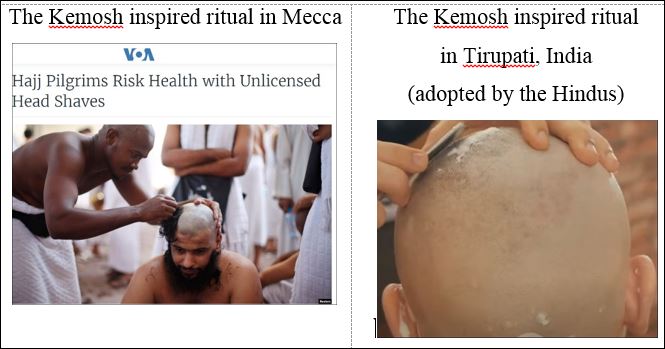The Talmud in tractate Sanhedrin, page 64a as translated by https://halakhah.com/sanhedrin/sanhedrin_64.html explains the idolatry mistake of Rav Menashe (a religious Jew) who wrongly thought that it is permissible to participate in the stone throwing ritual to pelt the Marculis idol. Here is the full incident:
He that uncovers himself before Baal Peor thereby serves it, even if his intention was to degrade it. He who casts a stone at Merculis thereby serves it, even if his intention was to bruise it.
R. Manasseh was going to Be Toratha.17 On the way he was told, ‘An idol stands here.’ He took up a stone and threw it at the idol’s statue. Thereupon they said to him: ‘It is Merculis’. He said to them, ‘But we have learned, HE WHO CASTS A STONE FOR MERCULIS18 THEREBY SERVES IT.’ So he went and inquired at the Beth Hamidrash [whether he had done wrong, since his action was a gesture of contempt]. They informed him, We have learned, HE WHO CASTS A STONE AT MERCULIS19 [thereby serves it] — that is to say even if it is merely to bruise it. He said to them, ‘Then I will go and remove it.’ But they replied, ‘Whether one casts a stone or removes it, he incurs guilt, because every stone thus removed leaves room for another.’

Rambam as translated by Eliyahu Touger, (Moznaim Publishing), rules regarding this type of incident, in Hilchot Avoda Zara Chapter 3, Halacha 5
Anyone who serves a false god through its accepted mode of service – even if he does so in a derisive manner – is liable. What is implied? When a person defecates before Pe’or to repudiate it, or throws a stone at Marculis to repudiate it – since this is the manner of serving them – the person is liable and must bring a sacrifice [to atone for] his inadvertent transgression.
The following is a translation of Rambam’s Letter to R. Ovadiah the Convert (Responsa of the Rambam, Siman 448) regarding this issue.
“And so, these Yishmaelites today, all of them—children and women included—have eradicated idolatry from their mouths, and their error and foolishness lie in other matters, which cannot be written down due to the transgressors and evildoers among Israel. However, regarding the unity of G-d, may He be exalted, they have no error whatsoever. In truth, the Yishmaelites previously had three types of idolatry in those places: Peor, Marculis, and Kemosh. They themselves admit to these things today and refer to them by names in the Arabic language. The worship of Peor involves exposing oneself before it or placing one’s head down and raising one’s private parts toward it, as these Yishmaelites do today in their prayers. The worship of Marculis involves throwing stones, and the worship of Kemosh involves shaving the head and not wearing sewn garments. All these matters are well-known and explicit among us from before the establishment of the Yishmaelite religion. However, the Yishmaelites today say that we shave our heads and do not wear sewn garments during prayer in order to humble ourselves before G-d, may He be exalted, and to remember how a person will stand when rising from the grave. As for throwing stones, they say, ‘We throw them at the devil to confound him.’ Others among their scholars provide a reason, saying, ‘There were idols there, and we throw stones in the place of the idols, as if to say we do not believe in the idols that were there, and we throw stones at them as a form of contempt.’ Others say it is merely a custom. In summary, even though the origin of these practices is rooted in idolatry, there is no one in the world who throws those stones, bows in that place, or performs any of these actions for the sake of idolatry, neither with their mouth nor in their heart, but rather their hearts are devoted to heaven.”

Here is a partial list of great sages who disagree with the Rambam’s Lenient View on this issue.
- The uncensored Kuzari as brought down in the textual edition of Rashbatz in Keshet Umagen
- Yad Rama, Sanhedrin 60b
- Ibn Ezra to Daniel 11 verse 30
- Ri Migash (the sages of Spain) quoted by Meiri to Avoda Zara 57a
- Rav Nachshon Gaon quoted by Sefer HaEshkol (Albek) Hilchot Yayin Nesech, page 150b
Further suggested reading: On the Issue of Kiddush Hashem – Accepting the Yishmaelite Religion is Like Accepting Idolatry
Footnotes
- 17 A town in Babylonia, on the road to Pumbaditha, ‘A.Z. 26a. It may perhaps be identified with Bithra, on the south of the royal canal, on the Seleucian road (A. Neubauer, Geographie du Talmud, p. 363).
- 18 [H] i.e., as act of worship.
- 19 He was told that the reading in the Mishnah is [H] AT MERCULIS, implying even as a gesture of contempt.
